How should you be choosing social media platforms for marketing?
Picking social media platforms is hard.
There are several hundred out there, maybe even thousand, and as a result, the process of choosing becomes a lot more difficult.
You obviously have the biggest ones like Facebook, Instagram, Twitter, and Pinterest, just to name a few, but is it really the number of social media users that you should base your choices of social media platforms?
Or should you look beyond the user count of the different platforms and just choose the platforms that suit your brand?
Is it better to select lesser-known social platforms like Pheed, Ning, hi5?
There are a lot of questions when it comes to selecting social media platforms, and the answer to the title is that it depends -on several factors, which I’ll go into in more detail.
In this article, we’re looking at everything that is worth considering when choosing social media platforms for your brand
Why choose social media sites?
I’ve said this many times before, but I’ll say it again.
You won’t generate better social media marketing results by using more social media sites.
In theory, it might sound like a good idea. You just add the total number of users on each site together, and that is your potential reach. This means that you’ll be able to reach a broader audience by using lots of social media sites.
Or not.
Sure, the number of users that are using a social media site isn’t completely irrelevant when choosing a social media platform, because this can give some kind of indication of the platform’s popularity and which direction it is heading.
But when deciding what social platforms to use, just looking at the user counts and then choosing platforms is dangerous for many different reasons.
First, you need to realize that the total number of the social media platform is almost completely irrelevant to you. Firstly, unless you have millions and millions to spend, you will never reach all of those users, so it won’t matter if the platform has 50 or 150 million users, as you won’t notice any difference.
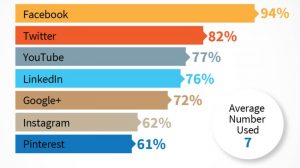
Plus, you don’t want to reach everyone. Think about how many people on a social media site that couldn’t care less about your brand and that isn’t your target audience.
This is why user count on a social media isn’t as important as what people are using it.
What is worth having in mind, though, is that if a social media platform has fewer users it might mean that fewer people from your target audience are using it, but it doesn’t have to be that way.
The reason why you should choose social media sites is simple. You simply don’t have time to manage them all.
Sure, if you’re a billion-dollar corporation like Coca-cola or a brand that greatly emphasize social media, you probably have the resources to be active on social media, but that does still not mean that the more platforms you’re on, the better.
Because what will happen when you hop onto every single social media platform you can come across is that you’ll end up spreading yourself thin, and generate lousy results on a ton of different platforms, rather than generate amazing results on a few.
And which of those do you think is best?
Different from what a few people still think, social media demands a lot of resources, planning, and strategizing.
And if you don’t have the time or the people to do all of that for all your social media sites, then, to be frank, social media will probably not be beneficial to your brand.
For instance, which brand will you be most positive to, if you stumble across it one day: a brand that has two social media accounts with 500K followers on each, or a brand with 15 social media platforms with 650 followers on each?
There’s a misconception that the more social media sites you’re active on, the better results you’ll be able to generate.
But this is not necessarily true. And it is especially not true if you don’t have the resources to manage them properly.
Choosing social media sites: Where to start?
Okay, so but now, you know that there is an endless number of social media platforms to choose from, but where the heck do you start, right?
Well, the vast majority of brands and people start by looking at the most popular social media platforms, and that makes sense because this makes it more likely for the brand to find their target audience there.
In terms of the number of users, here are the most famous and some of the most popular social media platforms that you can use:
- Facebook 2,130,000,000
- YouTube 1,500,000,000
- Instagram 800,000,000
- Twitter 330,000,000
- Pinterest 200,000,000
- Tumblr 115,000,000
- Flickr 112,000,000
- Google+ 111,000,000
- LinkedIn 106,000,000
I’ll go more into detail on the most popular social media platforms further on, but now, let’s look at the things that are worth having in mind when choosing social media platforms for your business.
It’s all about your audience
Choosing social platform really is all about your audience.
After all, what is the reason that you are going to, or are using social media in the first place?
To reach your target audience, right?
But what if your target audience isn’t to be found on the platform you’re using?
Then, all of your efforts would be in vein.
Because ultimately, what will have the biggest impact on how well your brand performs, what results it drives, and so on, will, apart from how you develop your strategy be dependent on your target audience.
It doesn’t matter if you run the most amazing social media campaign if your target audience isn’t using the platform, right?
This is why, when choosing social media platforms to use, you want to look at the user demographics of the respective platform you plan on using.
Pinterest, for instance, is known to have a user base which consists of a majority of women, and this means that it might not be an ideal platform to use if your target audience consists of men.
Moreover, Snapchat is a platform that is known to cater to the younger audience and appeal to teens, so therefore, it might not be the best platform for you to use if your target audience consists of women who are 50+ years old.
And this doesn’t just go for when you selecting social media platforms, this goes for all types of marketing efforts. If you don’t reach the people who care about you or your industry, it won’t matter how much money you pour into it, how great strategies you have, or how hard you work.
What objectives do you have and what is your social media strategy?
This is something that is crucial to think about when choosing social media platforms. Different social media platforms are great for different things, and therefore your choice of platforms should reflect your objectives.
For instance, Facebook is amazing for increasing brand awareness and generating leads, but if you want to connect with experts and professionals in your industry, LinkedIn and Twitter should be your go-to platforms.
What social platforms are your competitors doing?
While you shouldn’t look blindly on what your competitors are doing, looking at what social platforms are using can be extremely valuable.
But you should only be looking at your most successful competitors.
Go to their different social media platforms and see if they are generating great results there.
If they are generating amazing results on that platform, chances are, you will too, as long as you have a great strategy, because that means your target audience is to be found there.
Moreover, by looking at your competitors, you can identify the things that are working, and the things that aren’t.
So, instead of looking at the demographics and then taking a shot, you can see if your competitors are generating great results, and if they do, chances are, you’ll be able to, too!
Consider emerging platforms
Now, for the major social media platforms, the history has already been written.
You know that they are huge and that they have tons of attention.
The history is already written.
But if you take a shot at emerging social media platforms, it can be extremely valuable in the end. But you should also be aware of the fact that the platform you thought would explode can slowly fade away and get forgotten.
The benefit of hopping onto emerging social media platforms is that the competition is tremendously low, and thus it is a lot easier to gain traction.
I remember when Instagram was in its early years. Growing your presence was a completely different game than it is today. This is why identifying emerging platforms can be tremendously valuable in the end.
How many platforms can you manage at once?
This is an important question you need to ask yourself.
As mentioned, social media demands both time, effort, and money, and you need to know your limits and resources because otherwise, you’ll just end up spreading yourself thin.
Understand the content that drives the platform
Another thing you want to consider when choosing social media platforms for your business is the type of content that the platform is focused on.
Pinterest, for instance, is almost solely focused on visual content in the form of photos, YouTube is only focused on video, and Instagram is mainly focused on images.
And this is something you want to have in mind. You don’t want to hop on a social media platform with the hopes of sharing your kick-ass video, and then, you realize that you cannot post videos.
When choosing platforms, you should, therefore, think about what type of content you are best at creating, and then chose platforms accordingly.
If you are awesome at creating fun and engaging videos, like Blendtec, then obviously you should choose a social platform that supports video, or maybe even is solely focused on it.
Understand the key differences
Apart from the fact that all social media platforms have different target audiences, and that they are focused on different kinds of content, there are also plenty of other key differences between the different platforms.
When it comes to social media platforms, there really isn’t a one size fits all.
It’s also important to understand that there are no fixed ”best social media platforms for marketing”. Because what ultimately affects how well your social media marketing performs is if your target audience is there to watch it. And this will obviously be different for different brands.
Now, let’s dig into some of the most popular social media and see if they are something for your brand.
1.Facebook
I can’t help but put Facebook first on this list. It is the social media platform with the most users in the world, and it is also the most powerful and famous social media platform in the world.
In the fourth quarter of 2017, Facebook had 2.2 billion monthly active users, which is really quite significant.
What does this mean for brands?
Well, with all of those users, the vast majority of brands will be able to find their target audience on Facebook.
And a lot of brands seem to be doing just that. Because according to a study, 80 percent of small business owners use Facebook for marketing. THat’s a sky-high number.
But it is important that you don’t just stop at the user count on a social media platform. Because a number doesn’t tell us a lot. We need to know who those users are.
In this visual from Sproutsocial, you can see the Facebook usage among key demographics:
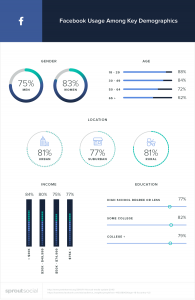
Does the user demographics match your target audience?
Something that is also worth having in mind is that even though something just says a few percents, it will still be a crazy number considering Facebook’s sheer size. And this will be a number of people who you’ll never reach completely.
Facebook is a go-to platform for almost all brands, so chances are, it will be a platform that you should use, too.
Lastly, Facebook is a platform that supports all types of content, and this enables all types of content creators to do what they prefer, and you share the content you are best at creating.
In recent years, video has become more and more popular, as well as live video and Stories, so if you can leverage that, chances are you’ll be able to generate great results.
When seeing how much more users Facebook has than its competitors, it’s not strange that you think the thought that everyone should be using it. And to a large extent, that is true.
Another great benefit of Facebook that is incredibly valuable for brands is that over all of these years, Facebook has been able to accumulate rich data about their users, which ultimately allows brands to run highly relevant and highly targeted ads on the platform.
But as the organic reach has decreased on Facebook for years, it might mean that in order to generate results worthwhile, you need to invest money into Facebook ads. The good news, however, is that Facebook’s ads, with the help of their rich user information, and as a result of the top brands haven’t realised the power of social media ads and that traditional display ads are losing efficiency, Facebook ads are very cheap, and has shown itself be able to generate a great ROI.
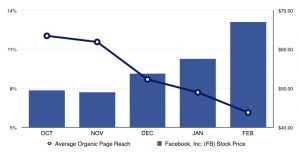
Relying on organic reach on Facebook is though, as it is lower than it has ever been – and is continuingly to decrease. Because in fact, Facebook said in a white paper that its users have uploaded more than 250 billion photos, and are uploading 350 million new photos each day, which means a ton of noise you have to cut through.
2. YouTube
There have been debates of whether or not YouTube is a social media platform because people don’t interact with each other in the same way, however, YouTube is more often referred to a social media platform than not, and that is why I am throwing it in here.
YouTube is a social media platform that is solely focused on video.
Have you tried making a post on YouTube without sharing a video?
(Hint: it’s not possible).
Therefore, if you are going to choose Youtube as a platform to focus on, you need to be great at creating appealing, high-quality visual content, because as all social media platforms, a ton of content is being put out on social media, and this means that the competition is tremendously tough.
If you’re skilled at creating engaging and high-quality videos, then YouTube is probably the platform for you!
But first, let’s look at the user demographics of YouTube first, so you don’t hop on a platform that doesn’t carry your target audience:
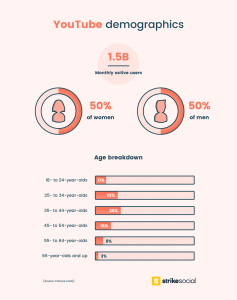
3. Instagram
Instagram is a platform that has been able to accumulate a huge user base, and today, Instagram has over 800 million monthly active users. Safe to say, a lot of people’s attention is put there.
Instagram is based on the concept of being a photo-sharing app for photographers to share pictures live and raw ”on the go”, but since launched, it has evolved a lot.
Today, though, it is still focused on visual content, and having text as something that adds context to the visuals, rather than being the center of attention.
While Instagram is a photo-sharing app, it is also possible to share videos.
Therefore, if you’re great at creating appealing visual content, especially when it comes to images, Instagram might be for you.
But before you decide, let’s look at the Instagram usage among key demographics of Instagram:
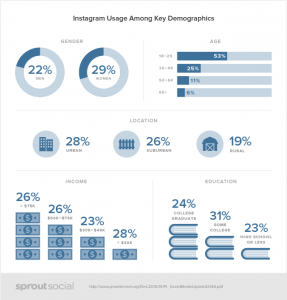
As you can see, Instagram is a platform that caters more to the younger generation than the older generation, however, Instagram has still made a journey, from first being viewed as something for teens (which the majority of Instagram’s first users were teens), to being a platform that the older generation can use, too.
4. Twitter
Twitter has been in the game for quite some time, and while you can post other types of content, it is a social media platform that is focused on text-based content, that should be engaging, snappy, and short.
Twitter has struggled a bit with content overload, and too much content than what can be consumed is being posted on Twitter, and this is also the reason why the organic reach on the platform is very low.
But that is not to say that you cannot generate great results on the platform.
In fact, for brands, Twitter is an especially popular social media platform to be used as a customer service tool. Because the short and snappiness of tweets allow brands to deal with customer service messages quickly and effectively.
Let’s look at the Twitter usage among key demographics:
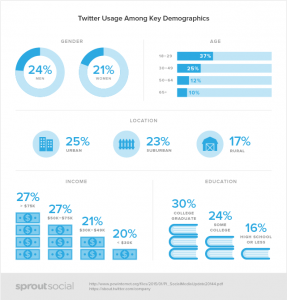
Conclusion
Choosing social media platforms to use is the most fundamental, but also one of the most important decisions of your social media strategy
What platforms you choose sets the bar for what type of content, and how well you perform, so obviously you want to choose platforms with great thought.
Moreover, it is also crucial that you understand that in order to succeed on social media, it takes time and effort, and it is better to focus on a few social media platforms than it is to spread yourself thin and generated average or below average results across an array of different platforms.


